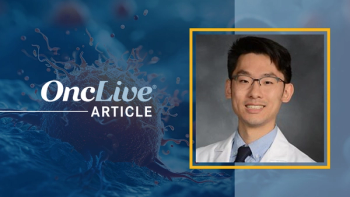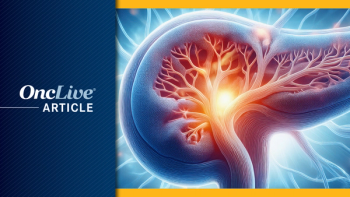
- Vol. 20/No.3
- Volume 20
- Issue 3
NCI-MATCH Results Offer Clues for the Use of Agents Across Tumor Types
A trickle of positive findings from NCI-MATCH, a precision medicine trial of numerous agents across tumor types, has encouraged investigators to broaden the number of trial arms, which now stand at 40, and expand enrollment.
Lyndsay Harris, MD
A trickle of positive findings from NCI-MATCH, a precision medicine trial of numerous agents across tumor types, has encouraged investigators to broaden the number of trial arms, which now stand at 40, and expand enrollment. Since the trial’s inception in 2015, molecular testing has been conducted on the tumors of 6000 patients and many arms have already closed to enrollment. Investigators expect to report more findings soon.
The landmark clinical trial conducted by the National Cancer Institute (NCI) and the ECOG-ACRIN Cancer Research Group channels patients into treatment arms based on molecular abnor-malities rather than cancer types. The trial is designed to determine if targeted therapies aimed at specific gene mutations will be effective regardless of tumor type. Investigators have identified 143 genes associated with cancer, specifically targeting mutations that cannot be treated by a current FDA-approved agent. Each arm of NCI-MATCH is evaluating at least 1 agent for efficacy across numerous common and rare cancer types.
“There is definitely some encouraging activity in a couple of the arms and some interesting observations about potential groups of tumors that would respond to the treatment,” Lyndsay Harris, MD, NCI study chair and deputy director of the NCI’s Cancer Diagnosis Program, said in an interview. “There are a number of studies that are mature but [investigators are] still in the process of submitting abstracts or writing their manuscripts. We should hear soon about some additional data.”
Findings from the EAY 131-Y arm reported in November showed that the investigational AKT inhibitor capivasertib (AZD5363) demonstrated clinical activity in patients with AKT-mutated cancers, supporting the validity of tailoring treatment to this tumor gene.
Preliminary data from 3 other arms of the trial (I, Q, and W) were released at the 2018 American Society of Clinical Oncology Annual Meeting. The results were considered mixed, although strong enough to warrant further investigation. And data from Arm Z1D released at the 32nd Society for Immunotherapy of Cancer annual meeting in 2017showed that nivolumab (Opdivo) demonstrated promising activity in mismatch repair—deficient noncolorectal cancers (CRCs).
One unexpected success of the trial is that enrollment of patients with rare or uncommon cancers has exceeded the initial estimate: 62.5% of enrolled patients have tumors other than the 4 most common cancers (breast, colorectal, non—small cell lung, and prostate), as opposed to the 25% original target for recruitment.
In November, Kevin Kalinsky, MD, MS, an assistant professor of medicine at NewYork-Presbyterian Hospital/Columbia University Medical Center, presented data from the EAY 131-Y arm. Thirty-five patients with metastatic AKT-mutated tumors who previously received at least 3 previous lines of therapy were assigned to twice-daily oral capivasertib, in weekly cycles of 4 days with treatment and 3 days without. Eight (23%) patients had tumor reduction and 16 (46%) had stable disease (SD). An estimated 52% of patients were alive and had SD 6 months following treatment.1
“We determined in advance that if 16% of patients experienced this response from the treatment, it would be a signal to move the drug on to a larger trial,” Kalinsky said in a statement. “This is a positive finding in a trial with patients whose cancers continued to grow despite previous treatments.”
In results from Arm I, 65 patients with mutations in the PIK3CA gene were assigned to taselisib, a potent and selective PI3K inhibitor that has shown sensitivity against the PI3K-α mutant isoforms and enhanced activity in PIK3CA-mutant tumors and cell lines in previous preclinical and clinical studies. Eligible patients had solid tumors or lymphomas that had progressed after 1 prior line of prior therapy or for whom there was no approved standard therapy. Thirty-two percent of patients in the cohort had 3 prior treatments and 37% had ≥3.2
Investigators did not observe any objective responses and 55% of patients had SD. However, 24% (90% CI, 17%-37%) of patients had a 6-month progression-free survival (PFS). The median PFS was 3.5 months (90% CI, 2.6-4.1). Even patients with aggressive cancer types, including lung cancer and cholangiocarcinoma, demonstrated prolonged SD.
Ian E. Krop, MD, PhD, and colleagues could not identify a pattern of mutations or a combination of mutations that predicted outcome. They added that it is possible PIK3CA mutations may not be the major driver in the tumors analyzed. Nonetheless, the investigators concluded that the disease control results are strong enough to continue investigating taselisib in these disease types.
In Arm Q, the drug ado-trastuzumab emtansine (T-DM1; Kadcycla) did not meet its primary endpoint for objective response rate (ORR) in heavily pretreated patients with HER2overexpressing tumors, excluding breast and gastric/gastroesophageal junction cancers.3 Three (8%; 90% CI, 2%-20%) of 37 patients achieved PR, defined as 30% tumor shrinkage. All 3 had a rare cancer: mucoepidermoid carcinoma of the parotid gland, squamous cell cancer of the parotid gland, or extramammary Paget disease of the scrotum.
The 6-month PFS rate was 25.4% (90% CI, 16%-41%) and the median time to progression was 2.9 months. One patient remains progression-free at 16.5 months.
Forty-six percent of the patients had SD, and Komal L. Jhaveri, MD, and colleagues observed durable SD responses in patients with ovarian, uterine, and colorectal cancers. Although this arm did not meet its endpoint, investigators concluded that the findings warrant further study, particularly in certain rare cancers such as salivary gland tumors.
In Arm W, investigators evaluated the drug AZD4547 in 50 patients with various solid tumors who had mutations in the FGFR pathway. The median age was 61.5 years (range, 22-84) and 90% of patients were white. The ORR was 8% (90% CI, 2.8%-17.4%). Four patients had a PR, 1 each with intrahepatic cholangiocarcinoma, transitional cell/urothelial carcinoma of the renal pelvis, HPV-associated squamous cell carcinoma of the cervix, and transitional cell carcinoma of the bladder. PFS for those patients was 334, 304, 156, and 166 days, respectively.4
Two patients had point mutations in the FGFR2/3 gene and the other 2 had FGFR3 gene fusions. Investigators concluded that that these mutations may be particularly sensitive to the drug and recommend further research into tumors harboring these fusions.
In results from Arm Z1D first presented in 2017, nivolumab induced an ORR of 24% (95% CI, 11%-41%) among patients with a range of non-CRCs with mismatch repair deficiency who were identified through the trial. The disease control rate was 56% and investigators observed a benefit across histologies.5
All patients had PRs, although investigators observed 2 unconfirmed complete responses. Nilofer S. Azad, MD, principal investigator for Arm Z1D and an assistant professor of oncology at Johns Hopkins University in Baltimore, Maryland, said at the time that 5 more patients had unconfirmed responses. Two of those patients remained on study at the time of data cutoff.
Figure. Ambitious Scope of NCI-MATCH Enables Evaluation of Multiple Cancer Types
“Biology Is Still Messy”
The median duration of response had not been reached at the time of data cutoff.George W. Sledge Jr, MD, chief, Division of Oncology, Stanford University Medical Center, and a 2018 OncLive® Giants of Cancer Care® honoree, has been both critical of some of the interpretations of the data from NCI-MATCH and excited about the trial’s possibilities. He said the trial itself, considering its size and complexity, has been a success.
“If you ask me whether the results of the trial have been equally successful, certainly [from] what was presented at ASCO [American Society of Clinical Oncology], I would say [they] have not been particularly exciting,” Sledge said to OncologyLive®. “My recollection was that none of the 3 drugs met their target level for what would constitute a success in terms of therapeutic benefit.”
Harris pointed out that not all the arms in NCI-MATCH would be successful, and that was never the expectation. “We were looking for signals,” she said. “Specifically, looking for which genes associated with a drug were actually showing response. We’ve definitely seen very encouraging activity in some arms and not as much in other arms, but that’s expected. Otherwise it wouldn’t be signal-finding.”
Keith T. Flaherty, MD, ECOG-ACRIN study chair and a medical oncologist at Massachusetts General Hospital Cancer Center, said that the lesson from the trial arms that didn’t demonstrate a consistency of response is that if investigators have uncovered a new tumor type that had not previously been investigated with a given therapy, that response should be considered the basis for further exploration of that therapy in that tumor type.
“The conclusion of MATCH is that the investigator community, pharma community, should consider focusing the further testing of that drug to replicate the finding that tumors X, Y, and Z can respond with some reliability to that therapy,” Flaherty said.
Sledge expressed respect and admiration for Flaherty, Harris, and the other investigators involved. He added, however, that genomics in medicine has limitations. “It’s not easy, and anyone who thinks drug development has been made easy because of the use of genomics...Well, it hasn’t,” he said. “It’s not a panacea, it’s not a magic fix. It’s something that in a few cases has given us really good leads and, in a few cases, not.
“Biology is still messy. Cancer is still hard. One dumb cancer is still worth 10 smart oncologists. None of those things have changed.”
For his part, Flaherty agreed, noting that it appears roughly 65% of patients do not have potentially targetable mutations. “Until such time as we get a lot smarter,” he said, standard therapies will remain the standard.
“Conventional chemotherapy drugs, the drugs that were developed from the 1950s to the 1990s and have been part of standard oncology practice ever since, essentially none of those have genetic markers that point to which patients should be treated and which ones shouldn’t,” he said. “That remains the relevant approach for 65% of patients.”
References
- Kalinsky K. AZD5363 in patients with tumours with AKT mutations: NCI-MATCH subprotocol EAY131-Y, a trial of the ECOG-ACRIN Cancer Research Group (EAY131-Y). In: Proceedings from the 30th EORTC-NCI-AACR Symposium on Molecular Targets and Cancer Therapeutics; November 13-16, 2018; Dublin, Ireland. Abstract 001.
- Krop IE, Jegede O, Grilley-Olson JE, et al. Results from molecular analysis for therapy choice (MATCH) arm I: taselisib for PIK3CA-mutated tumors. J Clin Oncol. 2018;36(15 suppl; abstr 101). doi: 10.1200/JCO.2018.36.15_suppl.101.
- Jhaveri KL, Makker V, Wang XV, et al. Ado-trastuzumab emtansine (T-DM1) in patients (pts) with HER2 amplified (amp) tumors excluding breast and gastric/gastro-esophageal junction (GEJ) adenocarcinomas: results from the National Cancer Institute (NCI) Molecular Analysis for Therapy Choice (MATCH) trial [published online June 1, 2018]. J Clin Oncol. 2018;36(15 suppl; abstr 100). doi: 10.1200/JCO.2018.36.15_suppl.100.
- Chae YK, Vaklavas C, Cheng HH, et al. Molecular analysis for therapy choice (MATCH) arm W: phase II study of AZD4547 in patients with tumors with aberrations in the FGFR pathway. J Clin Oncol. 2018;36(15 suppl; abstr 2503). doi: 10.1200/JCO.2018.36.15_suppl.2503.
- Azad N, Overman M, Gray R, et al. Nivolumab in mismatch-repair deficient (MMR-d) cancers: NCI-MATCH Trial (Molecular Analysis for Therapy Choice) arm Z1D preliminary results. Presented at: 32nd Society for Immunotherapy of Cancer Annual Meeting; November 9-12, 2017; National Harbor, MD. Abstract O37.
Articles in this issue
almost 7 years ago
New Agents Push the Envelope in Ovarian Canceralmost 7 years ago
Immuno-Oncology Expert Highlights How Steroid Dosage Influences Responsealmost 7 years ago
Microbial Metabolomics: A Search for the Missing Link to Canceralmost 7 years ago
From One Cancer to Many: How NSCLC Treatment Has Changed in 20 Yearsalmost 7 years ago
Is the Sipuleucel-T Saga Poised for a New Chapter?almost 7 years ago
Online Tool Estimates the Risk for Lynch Syndromealmost 7 years ago
New Findings Expand Options in Early HER2-Positive Breast Cancer


































